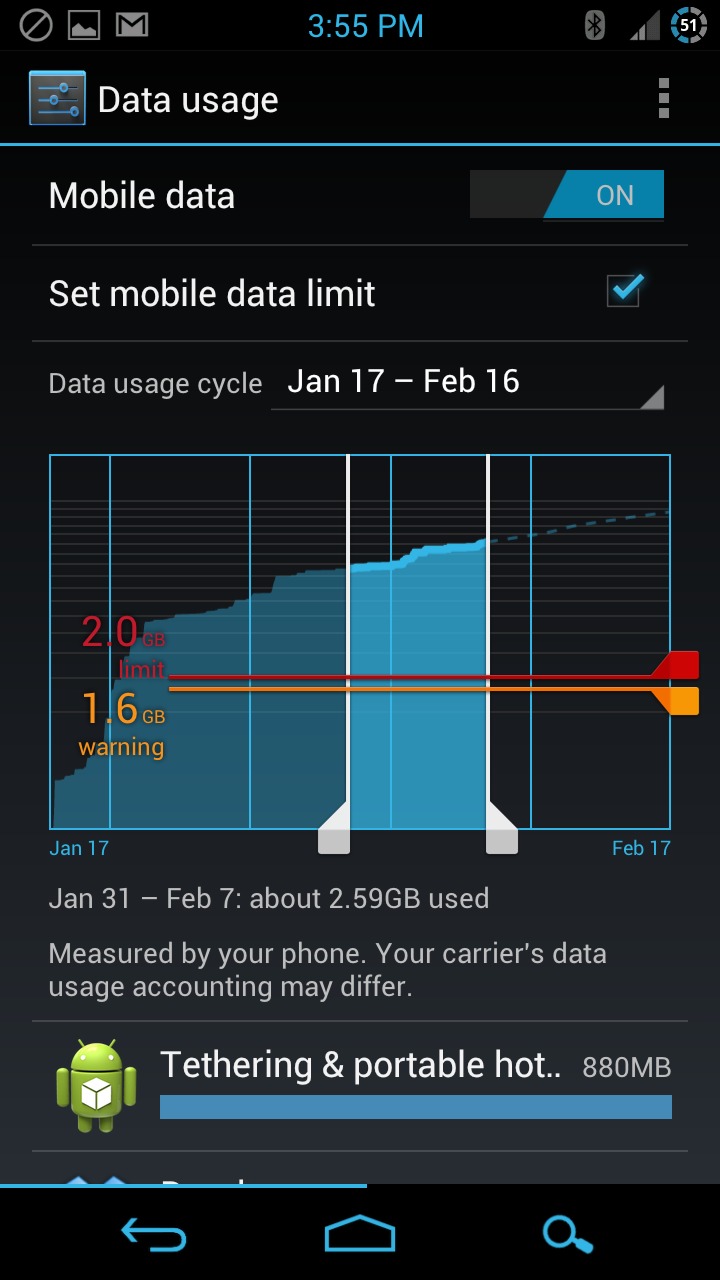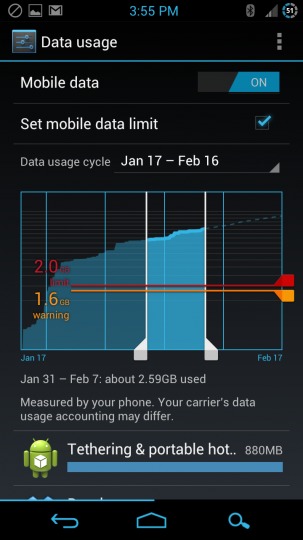
Android users are a data-hungry bunch: we download music, movies, games, and no small amount of regular web and other data. Of course, we pay the same as regular mobile Internet users, for the most part – a fact that’s led both AT&T and Verizon to abandon their formerly unlimited data plans for more rigid tiers. But if you’re lucky enough to have had an unlimited plan when the change went into effect, you’re grandfathered in… much to the dismay of both company’s accounting departments. For AT&T at least, it looks like they’re finally taking steps to encourage users to change their “data hog” ways. A Wall Street Journal writer got hit with a warning that he was in the top 5% of users on his iPhone, and his service would be intentionally slowed soon if he didn’t change his ways.
We’ve known this is coming for months, but that doesn’t mean we’re happy about it. Truth be told, we’re not particularly pleased with the tiered data system, which implies a mobile bandwidth crunch without any empirical data to back it up. The simple fact is that on AT&T and Verizon, those with grandfathered unlimited plans can get a lot more for their dollar (in both cases, $30 a month) than can those customers who A) want more than 2GB of data a month and B) signed a new contract after the changes went into effect. To punish unlimited users for using their unlimited connection isn’t just disingenuous, it implies that they’re doing something wrong, as if the Internet itself was a non-renewable resource and they’re taking more than their fair share.
I must stress that AT&T limiting high-bandwidth users isn’t illegal in any sense. T-Mobile already does this with their “unlimited” plans, even though the smaller company is actively marketing them. In legalese, the “limit” (or lack thereof) applies to the amount of data transferred, not the speed at which it’s delivered. All that being said, limits of any kind on a service that was marketed as unlimited, however long ago, rubs power users the wrong way. This is doubly true considering how wireless service and its various satellite charges have become more expensive, even as the larger carriers seem to be raking in the money more than ever before. Even Verizon’s “Double Data Deals” come off as cheap attempts to lure in new customers with a “better value”; just remember when you’re paying $80 a month for 20GB of bandwidth that a small portion of Verizon users can go over 100GB and beyond for just thirty bones.
The good news is that if you receive a warning letter or email from AT&T, it’s probably grounds enough to get out of your current two-year contract if you so choose. The change in AT&T’s interpretation of their own rules is enough to make the huge ordinary early termination fee waivable, at least if you press your point with the right customer service agent. (Dropping a few names like the Better Business Bureau and The Consumerist couldn’t hurt.)

Even so, the pressure from a provider to alter its customers’ behavior to suit its own ends is not encouraging, especially when that provider does not offer the service that said customer originally paid for to others. AT&T’s recent attempt to buy out T-Mobile (instead of, for instance, spending several billion dollars on its own often disappointing 3G network) only serves to alienate them from American consumers wary of cellular companies. AT&T, Verizon: if you don’t want smartphones to devour gobs and gobs of data, why do you advertise them streaming music, HD movies and generally being the awesome connected devices that they are?
Here’s the gist of my little rant: AT&T needs to either offer truly unlimited service or quit implying that it wants its customers to enjoy the “freedom” that web-connected devices allow. Don’t tell us we’re unlimited, or even how great your service is, if you want us to use WiFi all the time. Failing that, give us real, concrete reasons why the current tiered system is absolutely necessary – because from our consumer standpoint, its only purpose is to net you some extra gotcha fees when we go over. (That goes for you too, Verizon.) Warning customers that they shouldn’t be using their phones as much is a great way to drive them to somebody else – or at least it would be, if more carriers offered real unlimited service.
You get that, nationwide carriers? Whoever offers real unlimited service again, on a carrier that’s reliable and available, gets the dollars of power users. You know, the ones who are always first in line to pay those ridiculous subsidized smartphone prices.










So, Sprint?
He said “reliable”. and i want to add good. so No, not sprint
Begin soon? they have been throttling for months already… I hit the cap for the last three months…
Ive been on sprint for years and the only reason why I stayed with them is because of their cool phones. Their service sucks and now their customer service is going down hill too. I lost my premier status and now theres really no reason to stay with them. Yes, sprint has unlimited Internet…when it works.
Everyone here can complain all they like, but the fact of the matter is Sprint is the only company who has unlimited service. And if you can’t pick up a signal, then there’s always wifi.
I have both sprint and at&t phones, one for work and one as a personal phone. I would rather have AT&T any day of the week over my crappy, never any signal, sprint pos.
sounds like a bad area not represntative of the network entirely…. or you just need to spend a couple of dollars or more for a new device. You like paying more for less features? Got me!!
I’ve been consistently blasting through 10gb/mo on Sprint for the last 2-3 years, never got any BS letter from them.
Just came here to say sprint can suck it! I switched to tmo two months ago and never looked back.
Worst carrier around. Bright choice sparky!
So why in the world was Sprint not mentioned in the article? Unlimited!! Reliable!! Tier ! National!